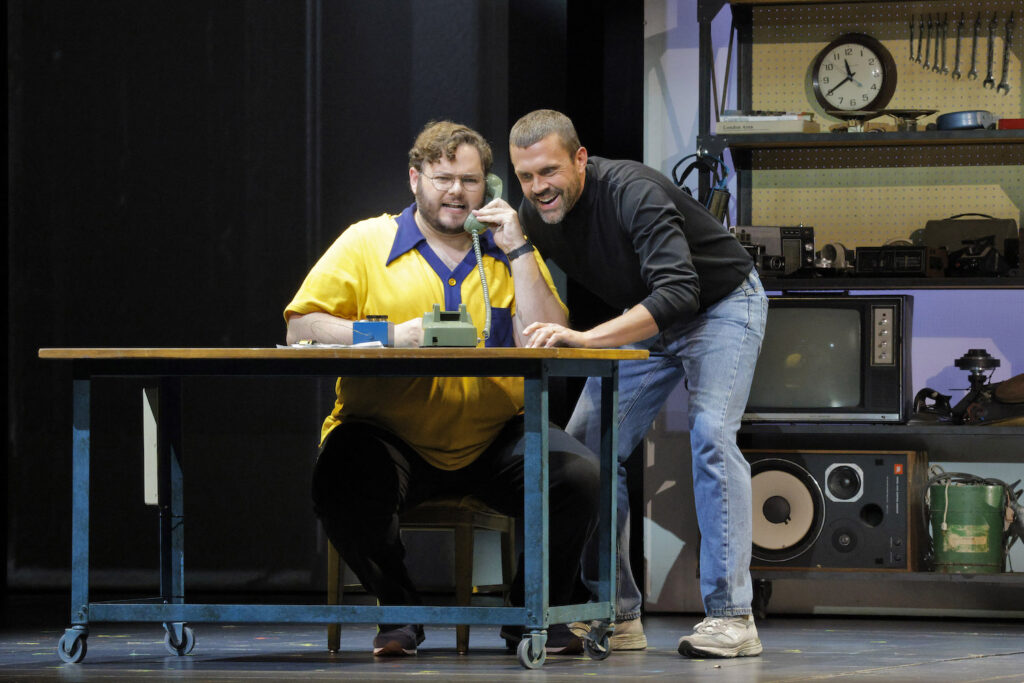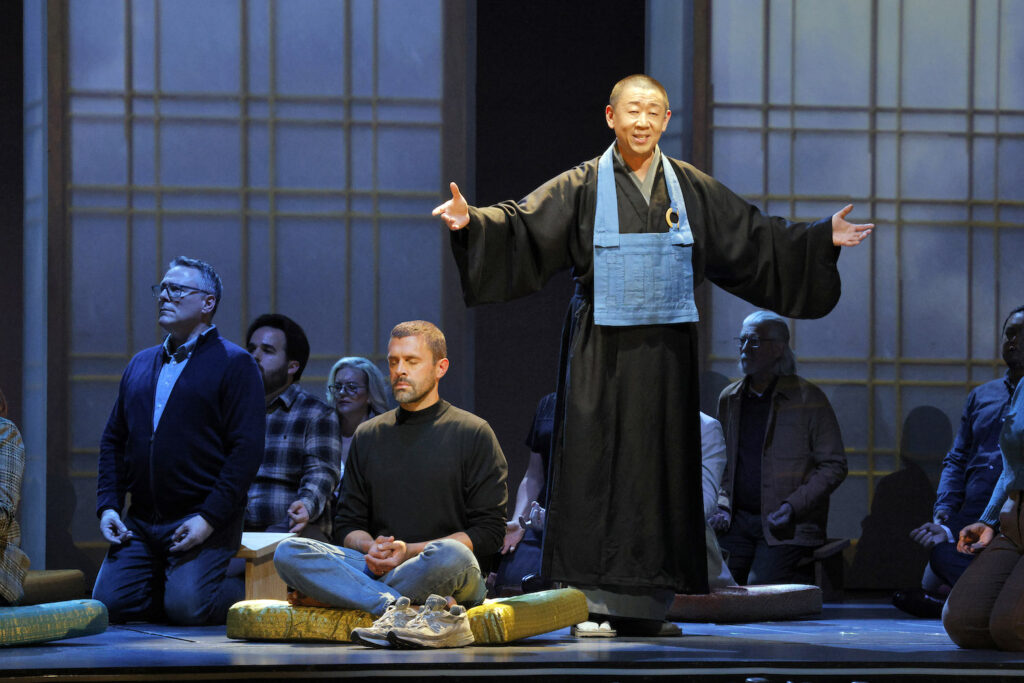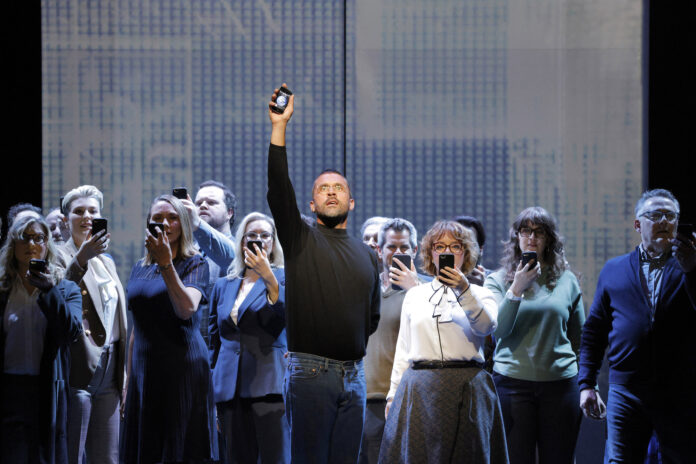I didn’t know what to expect when I heard of about a Steve Jobs biographical opera. I certainly didn’t expect it to have anything in common with a recent musical bio about Soul Train creator Don Cornelius. Nevertheless composer Mason Bates and librettist Mark Campbell’s The (R)evolution of Steve Jobs (Bay Area premiere through Sat/7 at the War Memorial Opera House, SF) is so similar to Hippest Trip: The Soul Train Musical that they’re akin to documents created from the exact same template.
It’s not just that both wallow in biographical clichés, it’s also the way they both simplify and apotheosize their subjects without any clear understanding of them. Worse yet, both productions downplay their subjects’ well-documented histories of abuse. They don’t present complex men who smiled in public while shouting (or worse) in private, they show innovators surrounded by ingrates who just don’t understand genius.
For (R)evolution, Steve Jobs (US baritone John Moore, who looks more like David Mamet) isn’t the mouth-frothing micro-manager who overworked employees before being ousted by his own hubris. No, here he’s simply an unmatched perfectionist and devoted husband to Laurene (US mezzo Sasha Cooke), who lovingly frets over him the way all wives do in these stories. He likes meditating and taking long walks in the parks of Cupertino. If Laurene loves him, then he must be a guy anyone could love. So we’re told.
Both (R)evolution and Hippest Trip also shortchange their subject with narratives that try to cram several decades’ worth of events into short yarns. We begin at the 2007 introduction of the first iPhone (with awkward staging that makes it look less like a convention hall and more like an AA meeting) before a wincing Jobs meets the ghost of his former spiritual mentor Kōbun Chino Otogawa (Chinese bass Wei Wu). Otogawa then pops in-and-out as Jobs—still adorned in his trademark jeans and turtleneck—hops back-and-forth through important moments of his life.
We see him studying calligraphy at Reed College, dropping acid in the park with girlfriend Chrisann Brennan (Canadian soprano Olivia Smith), and building the Apple I in the garage with Woz (US tenor Bille Bruley). Eventually, a still-living Otogawa tells him to just “simplify” everything he creates. Next thing we know, Steve is rich. Just like that.

Photo: Cory Weaver
And here’s the thing: The libretto never helps us along with this. The only reason I know who’s who is because I actually do know about the life of Steve Jobs. (R)evolution is so quick to get from one point to another that nothing lands. Chrisann and Otogawa are never addressed by name (the latter is just called “Spiritual Mentor” and the former is only alluded to as “Miss Brennan is on the phone”), but I knew who the former was because she’s identified as the alienated mother of Jobs’ first child, which he denies. In fact, the portrayal of real-life hippie Chrisann is so restrained here that she and Steve’s acid-dropping scene is conservative enough to be in Sundays in the Park with George.
Similarly, Jobs’ time at Apple is never clarified. He’s shown in the garage with Woz, then going over sketches in his Apple office, then told he’s being “transferred” by anonymous Apple board members before he quits in protest. Yes, really. No John Sculley, no apple ][, no Macintosh (or Lisa, for that matter), no NeXT, no Pixar. One moment, Steve is at Apple saying “I quit!”; the next, he’s suddenly there again to present the first-gen iPhone. Not even a transitional iMac scene. One doesn’t expect every detail of the man’s life to be covered, but we expect some connective tissue between the moments we do see.
Which brings us around to the ending. At his funeral, Laurene laments about Steve’s tyrannical public persona and the fact that people never got to see “Version 2.0 Steve.” Yeah, well, neither do we. Jobs has no narrative arc in the opera. When he and Woz call themselves Davids battling corporate Goliaths, it’s meant to connect with the next scene in which Woz accuses Steve of now being Goliath, but we aren’t shown why Woz says that.
Help us save local journalism!
Every tax-deductible donation helps us grow to cover the issues that mean the most to our community. Become a 48 Hills Hero and support the only daily progressive news source in the Bay Area.
I get the show not having room for competitor Bill Gates, but there’s never any sense of Apple’s position in the market to justify Woz’s accusation. I know these things from having lived through the ups and down of both Apple and Silicon Valley just a few miles away. A layman walking into the opera has nothing to go on. They’re only told that this is an opera about the iPhone guy who does the hand-on-chin pose. (Yes, he strikes the pose here.)
In short, we are never shown the industry revolution or personal evolution of Steve Jobs. He’s just the guy who made—or, rather, took credit for making—the devices ubiquitous to the opera’s audience.

Much the same way Hippest Trip had a flimsy bookending device (narration by former dancers, including Rosie Perez), so too is (R)evolution bookended by scene of a man (US baritone Joseph Lattanazi) creating a maker space for his young son (whose child actor wasn’t credited in any materials I’ve been given). One would think that this is meant to show Jobs’ influence on innovators and hobbyists, but no. It wasn’t until I read the program that I realized the man is supposed to be Paul Jobs, Steve’s adoptive father, and that the young man is meant to be Steve. That’s how little effort was put into the libretto.
Which isn’t to say the opera is a total loss. I see in my notes that I frequently found myself enjoying sometimes-spacey, sometimes-jazzy, all classical score by local composer-conductor Mason Bates. All the performers have excellent voices, and Cooke’s dramatic performance as Laurene, along with her voice, make for the opera’s biggest highlight. And Victoria ‘Vita’ Tykun’s sets, accented by Ben Pearcy and Brad Peterson’s projections, are lovely to look at. But it’s all window dressing on a hollow story.
As this was a COVID-safe livestream I saw at home, there were now CO² readings to take.
Steve Jobs’ life was a series of crushing failures and grand successes. His personality was notoriously tempestuous. Hell, he even did presentations at the War Memorial Opera House, as depicted in Danny Boyle’s biopic. His story is perfect material for an opera. Just not this one.
THE (R)EVOLUTION OF STEVE JOBS Bay Area premiere runs through Sat/7 at the War Memorial Opera House, SF. Tickets and further info here.





